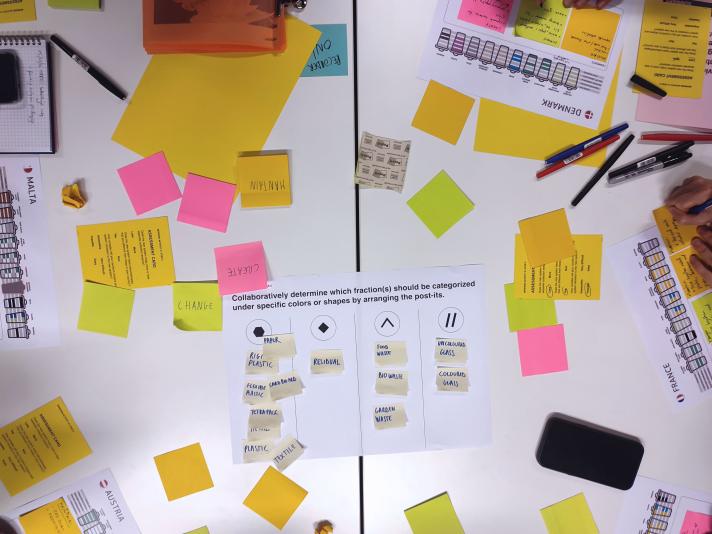
What’s new?
Legislative level
Earlier this spring, Council and European Parliament representatives reached a provisional political agreement on a proposal for a regulation on packaging and packaging waste. This proposal includes the development of harmonised waste sorting labels for the EU. The Joint Research Centre, including us in the EU Policy Lab have been working on this since 2022 in collaboration with the Directorate-General for Environment.
Our project
We have a multi-disciplinary team, including behavioural scientists, designers, and circular economists who are spearheading this iterative, participatory and evidence-based project. This is why, together with 31 experts from 20 Member States our team kicked off the design-driven qualitative research process to co-design waste sorting labels. Among them we benefitted from the expertise of:
producers and experts from industries that create and/or use products and packaging,
waste policy experts from local, regional, national, or European levels,
waste management experts, including companies, infrastructure, treatment centres, extended producer responsibility organisations, and municipal waste departments, as well as
organisations implementing national waste sorting schemes and
ecology and waste-oriented NGOs, scientists, cultural and educational awareness projects, and waste sorting communication-oriented initiatives.
All experts for the first workshop were selected through an open call, aimed at creating a diverse group of professionals related to the waste sorting field. Out of 171 applications, we contacted over 50 participants based on diversity of professions, roles, Member States distribution, age, gender, and availability. We excluded participants with less than 5 years of experience and non-EU countries. The experts participate in their individual capacity to this research project and our aim is to reveal and collect their knowledge, experience and needs related to packaging, waste, bins, and labels. We are focusing on concrete situations they are facing on a daily basis to identify the characteristics of a future harmonised EU waste sorting labelling scheme.
First workshop with stakeholders from the professional sector
This first workshop helped build the working group and developed a shared understanding of the EU's waste sorting labels on packaging and bins through activities focused on revealing tacit and embodied knowledge through creative and playful methods.
We first collectively explored different Member States' waste collection schemes, waste fractions, colours, and pictograms, to build a shared understanding of the situation across Europe.
Activity 1 Group 1 Creating a collective fictional new scheme with different constraints
Activity 1 Group 4 Assessing the fictional scheme’s impact on countries real situations
(Non)Memory Game Find and describe countries’ on-pack and on-bin labels
And then, together with participants, we explored how their professional activities relate to packaging, labels, waste, and receptacles. They mapped professional interactions in non-mixed groups, identifying daily interactions with packaging, labels, waste, and receptacles. This challenging exercise, inspired by journey maps and touchpoint mapping, was followed by an activity focusing on potential problems and solutions that might create a new system. For the latter, the participants also used topic cards to focus their analysis through specific lenses such as deposit return system, multi-layered packaging or other sustainability labels.
The sessions were concluded with collective sharing moments to highlight key learnings and takeaways.
Activity 5 & 6 Waste Cycle: Mapping human non-human interactions: packaging, labels, waste, receptacles
Following this first fruitful workshop, we are now preparing two more, which are part of a two-year qualitative and quantitative research and co-design process, which also includes
- the analysis and assessment of different waste sorting labelling schemes in the EU;
- a citizen survey with more than 16,000 participants from 21 Member States;
- citizen workshops with around 300 participants in 6 Member States;
- behavioural experiments with more than 11,000 participants in 11 Member States;
- the design of two prototypes and one final labelling scheme proposal.
The three workshops will allow us to:
facilitate knowledge sharing and the co-creation of knowledge between participants to develop a shared understanding of the waste management and labelling situation in the EU;
identify professional and country-related needs and challenges through the first prototype proposal;
- reveal professional and country-related needs and challenges through implementation scenarios with the second prototype proposal.
What’s next?
We’ll soon be meeting the experts again to co-analyse insights from the first workshop and identify key topics for the second workshop scheduled for October, where we will be presenting the first prototype.
Also in autumn we will have received the results of the citizen survey, we will organise a series of citizen workshops and in February we’ll meet our experts to discuss the second prototype.
This will be followed by a behavioural experiment to test our prototype, followed by work on the design of the EU harmonised waste sorting labelling scheme.
Stay tuned for the next developments!
Details
- Publication date
- 19 June 2024
- Author
- Joint Research Centre
- Department
- Directorate-General for Environment
- EU Policy Lab tags




